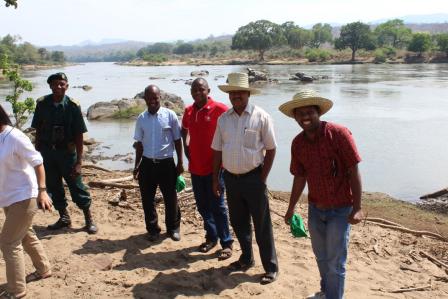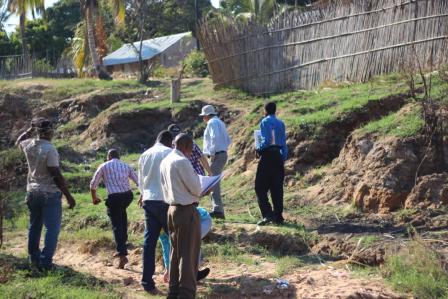EPA's Role in International Climate Adaptation
Climate change is impacting communities around the world. In addition to coastal, agricultural and Arctic communities, the effects are felt especially in cities, where populations are expected to grow significantly over the next 20-40 years.
EPA works to support international partnerships on climate adaptation by facilitating city-to-city sharing of information and experiences, and by helping cities adapt and build resilience to respond to anticipated climate changes. As new infrastructure is built in rapidly industrializing economies, cities in developing countries can test new adaptation and resilience strategies with existing global development assistance. These strategies can then be shared with communities in other developing countries and beyond, providing lessons learned worldwide including in the United States.
Current Work
- UNEP Global Adaptation Network (GAN)
- Durban Adaptation Charter (DAC)
- OECD Joint DAC-EPOC Task Team on Climate Change and Development
- Collaboration on Urban Adaptation Web Tool
UNEP Global Adaptation Network (GAN)
 Community members take part in a GAN learning exchange on building local resilience, Malawi, Africa.As awareness of climate change grows, a growing number of agencies, organizations, research institutes, and government bodies are working to understand patterns of vulnerability, how to adapt, and how to provide easy to understand information to the communities at most risk. Information critical to adaptation decision-making and planning is often fragmented and not always accessible to local stakeholders.
Community members take part in a GAN learning exchange on building local resilience, Malawi, Africa.As awareness of climate change grows, a growing number of agencies, organizations, research institutes, and government bodies are working to understand patterns of vulnerability, how to adapt, and how to provide easy to understand information to the communities at most risk. Information critical to adaptation decision-making and planning is often fragmented and not always accessible to local stakeholders. The Global Adaptation Network (GAN) of the United Nations Environment Programme (UNEP) builds climate resilience in vulnerable communities, ecosystems and economies by translating complex data into simple, results oriented information that can be used by communities to help them lead their own climate adaptation actions.
As part of the GAN, EPA helped initiate and launch new adaptation learning exchanges. These exchanges help local communities build climate resilience and adapt to climate change by facilitating the exchange of adaptation information from producers of knowledge to local and regional actors.
In 2016, the GAN Secretariat initiated three pilot adaptation leaning exchanges to show how developing countries can collaborate to solve problems posed by climate change and provide information to communities around the globe. Reports from each of these pilots will be widely available as a tool for other practitioners to use.
 GAN Learning Exchange: Building resilience through ecosystem-based approaches in Pemba, Mozambique.
GAN Learning Exchange: Building resilience through ecosystem-based approaches in Pemba, Mozambique.
- Two faith-based organizations, the Evangelical Fellowship of India Commission on Relief, located in SW India, and the Eagles Relief and Development Programme of SW Malawi, Africa, are working together to share approaches to community organization around climate adaptation and techniques for building crop-resilience to drought.
- The representatives of the municipal governments of Durban, South Africa, and the representatives of the municipal governments of Nacala, Quelimane and Pemba in eastern Mozambique are working together to share information on hard-engineering and ecosystem-based approaches to coastal adaptation and resilience.
- The third pilot exchange will take place in Latin America, to be completed by March, 2017.
EPA is also working with the GAN to diversify its capacity-building activities. For example, the GAN is hosting its first-ever training to build partnerships between local universities and municipal governments. Universities are engines for innovation and local economic growth and their students are future leaders. This university-local government partnership is modeled after a successful community service-based model, EPIC-N (Educational Partnerships for Innovation in Communities Network) which has been used successfully in the United States. By sharing the successful EPIC-N model through UNEP, EPA can spur local, self-sustained action to build resilience in communities around the world.
Learn more:
- Official Website: Global Adaptation Network (GAN) Exit
Durban Adaptation Charter (DAC)
 Meeting of Local African Leaders and Officials hosted by the Durban Adaptation Charter Secretariat, the City of Durban, South Africa and ICLEI Africa.
Meeting of Local African Leaders and Officials hosted by the Durban Adaptation Charter Secretariat, the City of Durban, South Africa and ICLEI Africa.The Durban Adaptation Charter for Local Governments (DAC) was the historic outcome of a local government convention held in Durban, South Africa, in December 2011, in parallel with the UN Framework Convention on Climate Change 17th Conference of the Parties (UN-FCCC-COP17). By signing the DAC, elected officials agreed to take actions to adapt to climate change and build resilience. To date, approximately 1100 elected local and urban government officials have signed the DAC, most from low-middle-income, developing country cities and municipalities.
EPA played a key role in forming the DAC, an example of how small investments of technical assistance from the United States have resulted in large, locally-led and sustained action in developing countries. The DAC also benefits U.S. cities by creating partners for them to work with on common problems.
To transform the DAC commitments into an implementation plan, in 2013, a representative subset of the DAC’s elected officials along with an international working group of adaptation experts, government agencies, and international organizations convened an implementation guidance workshop. The DAC Secretariat, located in Durban, South Africa, leads the implementation of the plan.
The DAC implementation plan is founded on 3 pillars:
- Sharing knowledge, information and experiences between developing country cities and between developing and developed country cities;
- Facilitating adaptation/resilience trainings on behalf of its members;
- Communicating the special circumstances and needs of cities and local governments as first responders to climate
Recent DAC accomplishments include:
 City officials from Durban, South Africa, showing members of the Durban Adaptation Charter, and other interested parties from a number of African cities, how to build local and urban resilience through forest restoration.
City officials from Durban, South Africa, showing members of the Durban Adaptation Charter, and other interested parties from a number of African cities, how to build local and urban resilience through forest restoration. - Elevation of city and local governments as important first-line responders to climate changes and implementers of local climate adaptation measures, as outlined in the Paris Climate Agreement.
- Development of a Durban-based local climate adaptation compact to coordinate regional adaptation activities, following a city-to-city exchange between the city of Durban, South Africa and the city of Ft. Lauderdale and Broward County FL, USA. .
- Sharing of coastal engineering techniques and coastal ecosystem-based protection measures and management practices, through city-to-city exchanges between Durban, South Africa and Dar es Salaam, Tanzania. Sharing of coastal ecosystem-based and hard engineering-based adaptation measures and the building of coastal resilience, through city-to-city exchanges between Durban, South Africa and Nacala, Quelimane and Pemba in Mozambique.
- Introduction and implementation of the Hub and Compact model, which establishes a structure for cooperation on adaptation governance and action between local, metropolitan and national governments. This model is currently being implemented in Durban metropolitan area, and plans are underway to expand the model to all of the other major metropolitan regions in South Africa as well. Several municipalities in Mozambique are also taking initial steps to implement this model.
Learn more:
- Official Website: Durban Adaptation Charter (DAC) Exit
OECD Joint DAC-EPOC Task Team on Climate Change and Development
EPA also participates in the Joint Development Assistance Committee-Environment Policy Committee (DAC-EPOC) Task Team on Climate Change and Development Co-Operation of the Organization for Economic Cooperation and Development (OECD). This Task Team has worked to assess the effectiveness and cost of climate adaptation measures.
The following reports on adaptation to climate change were produced as part of this cooperative effort:
The following links exit the site Exit
- Monitoring and Evaluation for Adaptation: Lessons from Development Co-operation Agencies
- Private Sector Engagement in Adaptation to Climate Change: Approaches to Managing Climate Risks
- National Adaptation Planning: Lessons from OECD Countries
- Adaptation Policy Forum and Summary Note - links to the forum agenda, and a summary note which followed the forum
- Climate Change Risks and Adaptation: Linking Policy and Economics
Collaboration on Urban Adaptation Web Tool
From 2012-2013, EPA collaborated with the Center for Climate and Energy Solutions or C2ES (formerly the Pew Center on Global Climate Change) to strengthen its searchable, interactive adaptation map tool and add information on early climate adaptation efforts in U.S. cities.
First published in August 2013, the map is facilitating city-to-city learning by providing a platform for cities to share experiences and knowledge. The current map tool features information on approximately 50 U.S. cities.
Contacts
For additional information on EPA's international climate adaptation programs, contact:
